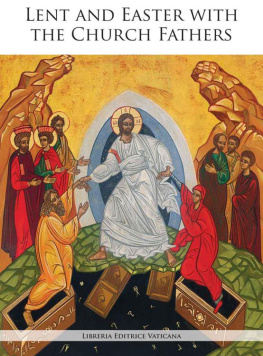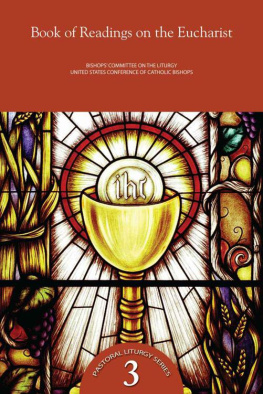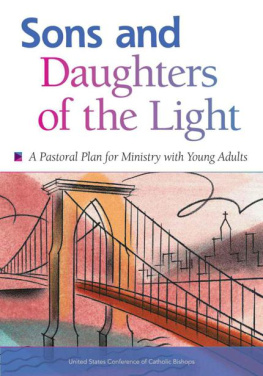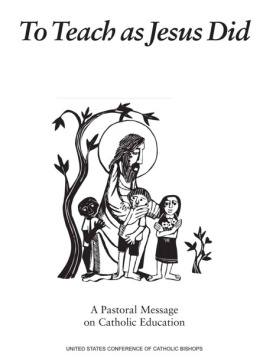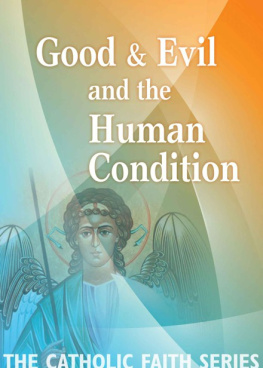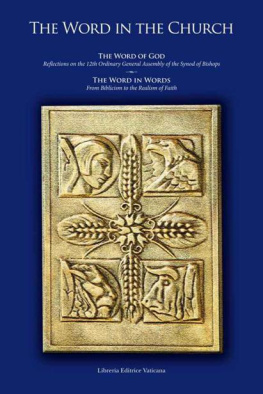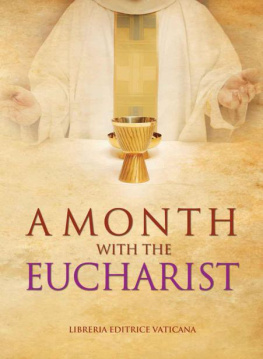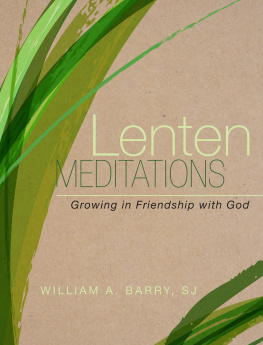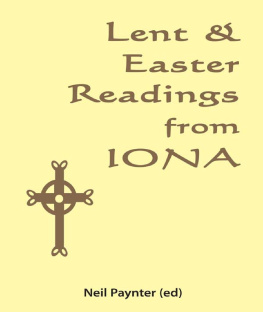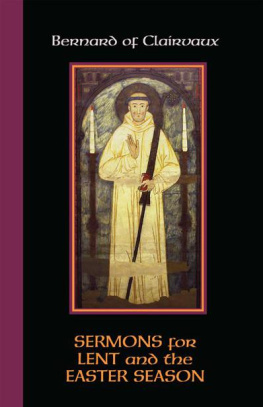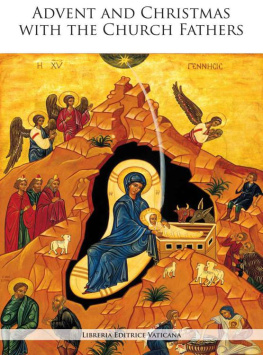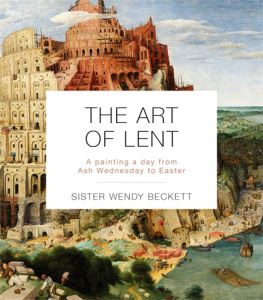LENT AND
EASTER WITH
THE CHURCH
FATHERS

Marco Pappalardo
Libreria Editrice Vaticana
United States Conference of Catholic Bishops
Washington, D.C.
CONTENTS
_________
For those who live
each day with hope
and a contemplative
gaze, confident that
all things work for good
for those who love God
(Rom 8:28).
INTRODUCTION
T he Holy Father Pope Benedict XVI, in his Wednesday general audiences from March 2007 through a good part of the year 2008, undertook the journey of presenting the Church Fathers. It was a steady and profound catechesis in the full sense of the word, recounting the story of the Church through the lives of men who were important personalities during the first centuries of Christianity. Each time, attention was given to highlighting the originality, and at the same time the modern relevance, of each Church Fathersome of whom are unknown to most peopleso that he could instead become accessible to everyone.
This book has been conceived with the same idea: aiming to present with great simplicity the thoughts and meditations of some of the Church Fathers regarding the key seasons of the liturgical year. The Fathers writings are in fact among the most important traditional documents, in terms of the richness of their content on multiple levels: spiritual, moral, dogmatic, and ascetic. Following the path laid by the Holy Fathers intuition, the idea of this book is to draw out the Church Fathers from the libraries or patristic archives in order to offer them to everyone, including those who are neither specialists, nor scholars, nor aficionados. In fact, this small book is not a text for study. It is intended to be a tool, even a daily companion, for meditation during Lent and the Easter season.
Anyone wishing to study these extraordinary men in greater depth can find works of great value, dense and impressive collections of their writings, monumental volumes, and monographic texts that are increasingly easy to access.
Each passage in this book is supplied with an introduction by the author, in order to provide a key to interpreting the selection and to bring the content to life for the modern reader.
Marco Pappalardo
MEDITATIONS

FROM ASH WEDNESDAYTO THE SATURDAY AFTER ASH WEDNESDAY

ASH WEDNESDAY
Augustine, Tractates on the Gospel of St. John , 49, 2
We are destined to die, and we do everything we can to avoid death. We cannot say the same for our efforts to avoid sin, despite the fact that we are called to eternal life. Were so attached to earthly things, and so little to heavenly goods, that we meticulously measure life in terms of seconds, minutes, hours, days, weeks, months, and years, often relegating our life in eternity to the back of our minds. We prepare ourselves spectacularly for a short trip, but how are we organizing our timeless final voyage?
V irtually everyone fears the death of the body, so few the death of the soul. Everyone worries about the death of the body, which must happen sooner or later, and does everything possible to avert it.... Yet all that one does to avoid death is in vain: at best one can only delay it, but never escape it. If instead one strives to avoid sin, he will not grow weary, and he will live forever. Oh, if we could only succeed in urging othersand ourselves together with themto love eternal life at least as much as they love fleeting life! What will a man not do when faced with the danger of death? How many, under threats hanging over their heads, have preferred to lose everything in order to save their lives! And who would not do so to avoid being struck down? And perhaps, even after having lost everything, some still lost their lives. Who would not be willing to give up the necessities of life just to stay alive, preferring a life of begging to an early death? If a man were told, If you do not wish to die, you must sail the seas, would he even hesitate to do so? If a man were told, If you do not wish to die, you must work, would he let himself be overcome by laziness? God commands us to do less burdensome things to give us eternal life, yet we neglect to obey.
THURSDAY
Gregory the Great, Commentary on Job , 21, 30
Humility helps us to recognize our need for the help of God and neighbor. Yes, we too, who think we know everything and can do anything on our own, must embrace our limits and see our lack. In this way, humility also helps us to see Christ himselfand not just an anonymous recipient of kindnessin the person we aid, awaiting our embrace.
O ne who puts on airs of importance in helping his neighbor commits the inner sin of pride, which wins out in proportion over the merit of the good external work. He remains naked inside while disdaining the naked person whom he clothes, and becomes worse than before by believing himself better than his neighbor in need. Indeed, one without humility is poorer than one without clothes. For this reason, when we observe the external destitution of our neighbors, we must reflect on the immensity of our own inner destitution; thus, we will not become inflated with a sense of superiority over them, plainly seeing how on the inside we are really more destitute than they.
FRIDAY
Origen, Prayer , 33, 1
Praying is stretching a hand toward the Infinite! It is a loving dialogue between our own impoverishment and the greatness of God. Our meager words, silence, abandonment, and meditation rise and go to the heavens. God will never hold back his hand when we turn to him with a sincere heart, with our limitations, and with our journey of faith.
A t the beginning, when starting to pray, we must lift our praises to God with all our strength, through Christ, glorified in the Holy Spirit, who is with him. After this, general thanks will follow, thinking of the benefits bestowed on many people and the personal ones received from God. After this thanksgiving, I think that each person should seriously accuse his own sins before God, entreating him to save us and free us from the state to which those sins have led us, and to forgive us for the wrongs committed. After the confession of sins, sublime and heavenly gifts, both individual and collective, will be requested for relatives and friends. And prayer must ring out in all of this as continual praise of God, through Christ, in the Holy Spirit.
SATURDAY
John Chrysostom, Homilies on Genesis , 10
When we talk about fasting or abstinence, we risk falling into an exaggerated and unfruitful pietism linked to abstaining from meat on Fridays and fasting on Ash Wednesday and Good Friday. Not that these things should not be respected or taken into consideration, but they should be done with a sense of understanding and a free heart.
A men, amen, many are the ways that can open to us the gates of trust in the Lord: many more than simple fasting! Therefore, may he who eats but cannot fast prove himself through more generous almsgiving, fervent prayer, and readiness in listening to the divine Word: the weakness of the body is no obstacle to all of these things. And may he reconcile with his enemies and eradicate every feeling of revenge from his soul. If he does this, he observes the true fast that the Lord asks of us above all, because the purpose for which he commands us to refrain from eating is this: to quell the petulance of the flesh, making it docile to the fulfillment of the law of God.

